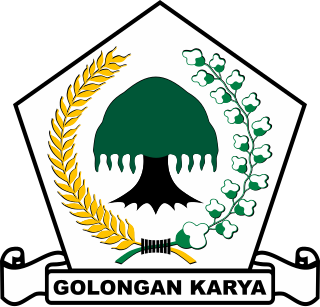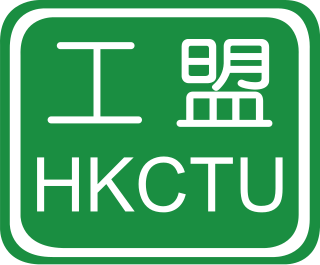
The politics of Indonesia take place in the framework of a presidential representative democratic republic whereby the President of Indonesia is both head of state and head of government and of a multi-party system. Executive power is exercised by the government. Legislative power is vested in both the government and the bicameral People's Consultative Assembly. The judiciary is independent of the executive and the legislature.
A trade union or labor union, often simply referred to as a union, is an organization of workers whose purpose is to maintain or improve the conditions of their employment, such as attaining better wages and benefits, improving working conditions, improving safety standards, establishing complaint procedures, developing rules governing status of employees and protecting and increasing the bargaining power of workers.

The civil service is a collective term for a sector of government composed mainly of career civil servants hired rather than appointed or elected, whose institutional tenure typically survives transitions of political leadership. A civil servant, also known as a public servant or public employee, is a person employed in the public sector by a government department or agency for public sector undertakings. Civil servants work for central and state governments, and answer to the government, not a political party.
Employment is a relationship between two parties regulating the provision of paid labour services. Usually based on a contract, one party, the employer, which might be a corporation, a not-for-profit organization, a co-operative, or any other entity, pays the other, the employee, in return for carrying out assigned work. Employees work in return for wages, which can be paid on the basis of an hourly rate, by piecework or an annual salary, depending on the type of work an employee does, the prevailing conditions of the sector and the bargaining power between the parties. Employees in some sectors may receive gratuities, bonus payments or stock options. In some types of employment, employees may receive benefits in addition to payment. Benefits may include health insurance, housing, disability insurance. Employment is typically governed by employment laws, organisation or legal contracts.

The Party of Functional Groups, often known by its abbreviation Golkar, is a centre-right big tent political party in Indonesia. It was founded as the Joint Secretariat of Functional Groups in 1964, and participated for the first time in national elections in 1971 as Functional Groups. Since 2019, it has been the second-largest party in the House of Representatives (DPR) with 85 seats. It is led by Airlangga Hartarto.

The Hong Kong Confederation of Trade Unions (HKCTU) was a pro-democracy labour and political group in the Hong Kong. It was established on 29 July 1990. It had 160,000 members in 61 affiliates and representation in the Legislative Council of Hong Kong (LegCo) to challenge government policies and push for legal protection of worker and trade union rights. It was one of the two most influential labour groups in Hong Kong, with the other one being the pro-Beijing Hong Kong Federation of Trade Unions.

Elections in Indonesia have taken place since 1955 to elect a legislature. At a national level, Indonesian people did not elect a head of state – the president – until 2004. Since then, the president is elected for a five-year term, as are the 575-member People's Representative Council, the 136-seat Regional Representative Council, in addition to provincial and municipal legislative councils.

Suharto resigned as President of Indonesia on 21 May 1998 following the collapse of support for his 32-year long presidency. Vice President B. J. Habibie took over the presidency.

The New Order describes the regime of the second Indonesian President Suharto from his rise to power in 1966 until his resignation in 1998. Suharto coined the term upon his accession and used it to contrast his presidency with that of his predecessor Sukarno.

Guided Democracy was the political system in place in Indonesia from 1959 until the New Order began in 1966. It was the brainchild of President Sukarno, and was an attempt to bring about political stability. Sukarno believed that the parliamentarian system implemented during the liberal democracy period in Indonesia was ineffective due to its divisive political situation at that time. Instead, he sought a system based on the traditional village system of discussion and consensus, which occurred under the guidance of village elders. With the declaration of martial law and the introduction of this system, Indonesia returned to the presidential system and Sukarno became the head of government again.
Trade unions in Ghana first emerged in the 1920s and have played an important role in the country's economy and politics ever since.

Legislative elections were held in Indonesia on 3 July 1971, the first under the New Order regime. There were ten participants; nine political parties and the "functional group" Golkar, which came first with more than 60 percent of the vote, resulting in an absolute majority in the People's Representative Council.

Legislative elections were held in Indonesia on 2 May 1977. They were the third legislative elections since independence, and the second under the New Order regime. There were three participants; the two political parties and functional group Golkar.

Legislative elections were held in Indonesia on 4 May 1982. They were the fourth legislative elections since independence and the third under the New Order regime There were three participants; the two political parties, the United Development Party (PPP), the Indonesian Democratic Party (PDI) and the "functional group" Golkar. As with all elections during the New Order regime, the government-backed Golkar organization won an absolute majority.

Legislative elections were held in Indonesia on 23 April 1987, to elect 400 of the 500 members of the People's Representative Council (DPR), the national legislature. The election was the fifth legislative election in the country since independence and the fourth legislative election under President Suharto's New Order. The election resulted in an outright majority for Golkar, which retained its status as the ruling party of the country.

Demir and Baykara v Turkey [2008] ECHR 1345 is a landmark European Court of Human Rights case concerning Article 11 ECHR and the right to engage in collective bargaining. It affirmed the fundamental right of workers to engage in collective bargaining and take collective action to achieve that end.

The Central All-Indonesian Workers Organization was the largest trade union federation in Indonesia. Founded during the period of the country's independence in the late 1940s, the federation grew rapidly in the 1950s. It was initially formed with loose connections to the Communist Party of Indonesia (PKI) and with members from other parties, but over time, the PKI became dominant in the organisation. With the introduction of President Sukarno's guided democracy in the late 1950s, SOBSI was formally recognised and given a place in the national decision-making structures. In the 1960s, SOBSI came into conflict with the Army, whose officers controlled the country's state enterprises. After the 1965 coup that subsequently produced Suharto's New Order regime, SOBSI was declared illegal, its members killed and imprisoned and most of the leadership executed.
A public-sector trade union is a trade union which primarily represents the interests of employees within public sector or governmental organizations.
South African labour law regulates the relationship between employers, employees and trade unions in the Republic of South Africa.
A general strike is a strike action in which participants cease all economic activity, such as working, to strengthen the bargaining position of a trade union or achieve a common social or political goal. They are organised by large coalitions of political, social, and labour organizations and may also include rallies, marches, boycotts, civil disobedience, non-payment of taxes, and other forms of direct or indirect action. Additionally, general strikes might exclude care workers, such as teachers, doctors, and nurses.














